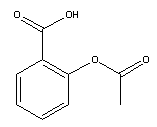

CAS: 50-78-2
o-Acetylsalicylic acid 2-Acetoxybenzoic acid
o-Acetylsalicylic acid 2-Acetoxybenzoic acid
Properties:
- Product Name: Acetylsalicylic acid
- Synonyms:93973: o-Acetylsalicylic acid 2-Acetoxybenzoic acid; 2-Acetoxybenzoic acid; aspirin usp; Aspirin; Acetoxybenzoic acid; Metronidazolum; 2-(acetyloxy)benzoic acid; 2-(acetyloxy)benzoate; Acetyl Salicylic Acid; Acetylsalicylic Acid
- CAS RN.: 50-78-2
- EINECS: 200-064-1
- Molecular Weight: 180.15
- Molecular Formula: C9H8O4
- Melting Point(℃): 136-140℃
- Boiling Point(℃): 321.4°C at 760 mmHg
- Flash Point(℃): 131.1°C
- Water Solubility: 3.3 g/L (20℃)
- Hazard Symbols: Xn Details
- Xn:
- Risk Codes: R22;R36/37/38; Details
- R22;R36/37/38;: Details
- Safety Description: S26;S36/37/39;Details
- S26;S36/37/39;: Details
FAQ:
What is o-Acetylsalicylic acid 2-Acetoxybenzoic acid and how is it
used?
o-Acetylsalicylic acid 2-Acetoxybenzoic acid is a compound that is commonly known as aspirin. It is used as a medication to reduce pain, fever, inflammation, and prevent blood clots. Aspirin works by inhibiting the production of certain chemicals in the body that cause pain, inflammation, and blood clots.
How does o-Acetylsalicylic acid 2-Acetoxybenzoic acid compare to other pain relievers?
Aspirin is in a class of medications called nonsteroidal anti-inflammatory drugs (NSAIDs), which also includes ibuprofen and naproxen. Aspirin is unique in that it not only relieves pain and inflammation but also has the added benefit of reducing the risk of heart attacks and strokes by preventing blood clots. However, aspirin may not be suitable for everyone, especially those with certain medical conditions, so it is important to consult a healthcare professional before using it.
What are the common side effects of o-Acetylsalicylic acid 2-Acetoxybenzoic acid?
Like all medications, aspirin can cause side effects. Common side effects of aspirin include stomach upset, heartburn, nausea, and gastrointestinal bleeding. More serious side effects include allergic reactions, liver damage, and kidney problems. It is essential to follow the recommended dosage and seek medical attention if you experience any severe side effects while taking aspirin.
How should o-Acetylsalicylic acid 2-Acetoxybenzoic acid be taken?
Aspirin is typically taken by mouth with a full glass of water. The dosage and frequency of aspirin will vary depending on the condition being treated. It is important to follow the instructions provided by your healthcare provider or the medication label. Aspirin should not be taken on an empty stomach to reduce the risk of stomach upset, and it is crucial not to crush or chew enteric-coated aspirin tablets as they are designed to be swallowed whole.
Can o-Acetylsalicylic acid 2-Acetoxybenzoic acid be used in children?
Aspirin should not be given to children or teenagers with viral infections, as it has been associated with Reye's syndrome, a rare but severe condition that affects the liver and brain. Children should be given age-appropriate pain relievers such as acetaminophen or ibuprofen instead of aspirin. It is essential to talk to a healthcare provider before giving aspirin to a child.
o-Acetylsalicylic acid 2-Acetoxybenzoic acid is a compound that is commonly known as aspirin. It is used as a medication to reduce pain, fever, inflammation, and prevent blood clots. Aspirin works by inhibiting the production of certain chemicals in the body that cause pain, inflammation, and blood clots.
How does o-Acetylsalicylic acid 2-Acetoxybenzoic acid compare to other pain relievers?
Aspirin is in a class of medications called nonsteroidal anti-inflammatory drugs (NSAIDs), which also includes ibuprofen and naproxen. Aspirin is unique in that it not only relieves pain and inflammation but also has the added benefit of reducing the risk of heart attacks and strokes by preventing blood clots. However, aspirin may not be suitable for everyone, especially those with certain medical conditions, so it is important to consult a healthcare professional before using it.
What are the common side effects of o-Acetylsalicylic acid 2-Acetoxybenzoic acid?
Like all medications, aspirin can cause side effects. Common side effects of aspirin include stomach upset, heartburn, nausea, and gastrointestinal bleeding. More serious side effects include allergic reactions, liver damage, and kidney problems. It is essential to follow the recommended dosage and seek medical attention if you experience any severe side effects while taking aspirin.
How should o-Acetylsalicylic acid 2-Acetoxybenzoic acid be taken?
Aspirin is typically taken by mouth with a full glass of water. The dosage and frequency of aspirin will vary depending on the condition being treated. It is important to follow the instructions provided by your healthcare provider or the medication label. Aspirin should not be taken on an empty stomach to reduce the risk of stomach upset, and it is crucial not to crush or chew enteric-coated aspirin tablets as they are designed to be swallowed whole.
Can o-Acetylsalicylic acid 2-Acetoxybenzoic acid be used in children?
Aspirin should not be given to children or teenagers with viral infections, as it has been associated with Reye's syndrome, a rare but severe condition that affects the liver and brain. Children should be given age-appropriate pain relievers such as acetaminophen or ibuprofen instead of aspirin. It is essential to talk to a healthcare provider before giving aspirin to a child.

